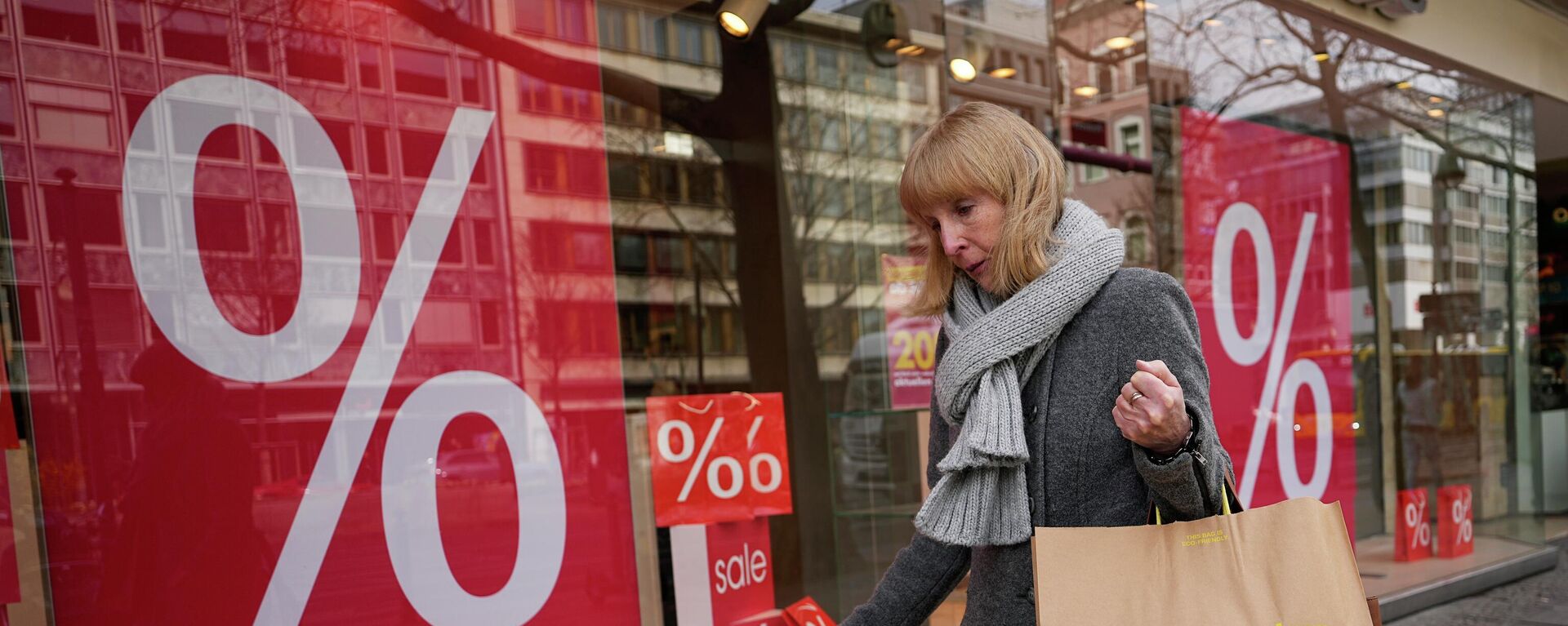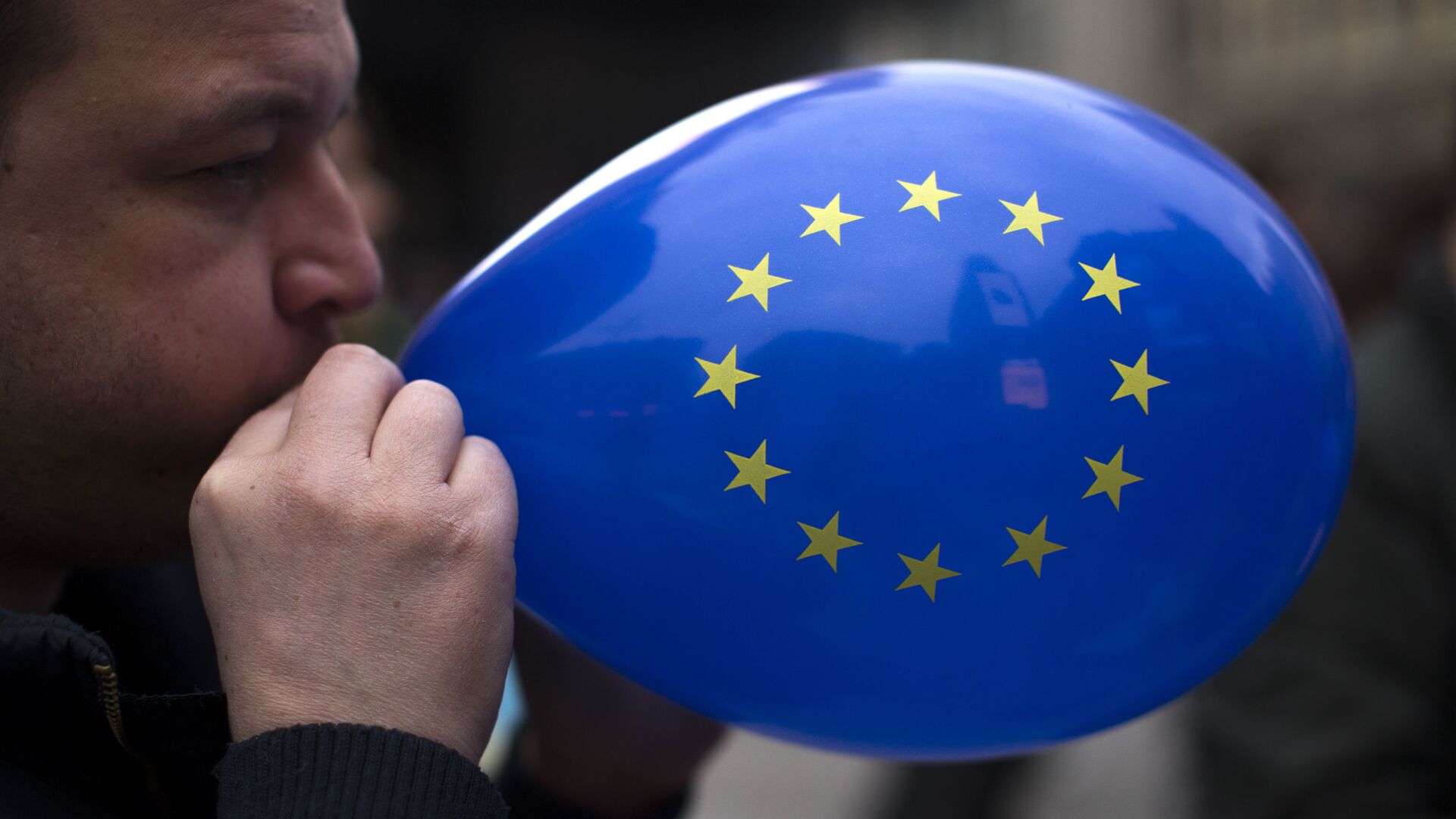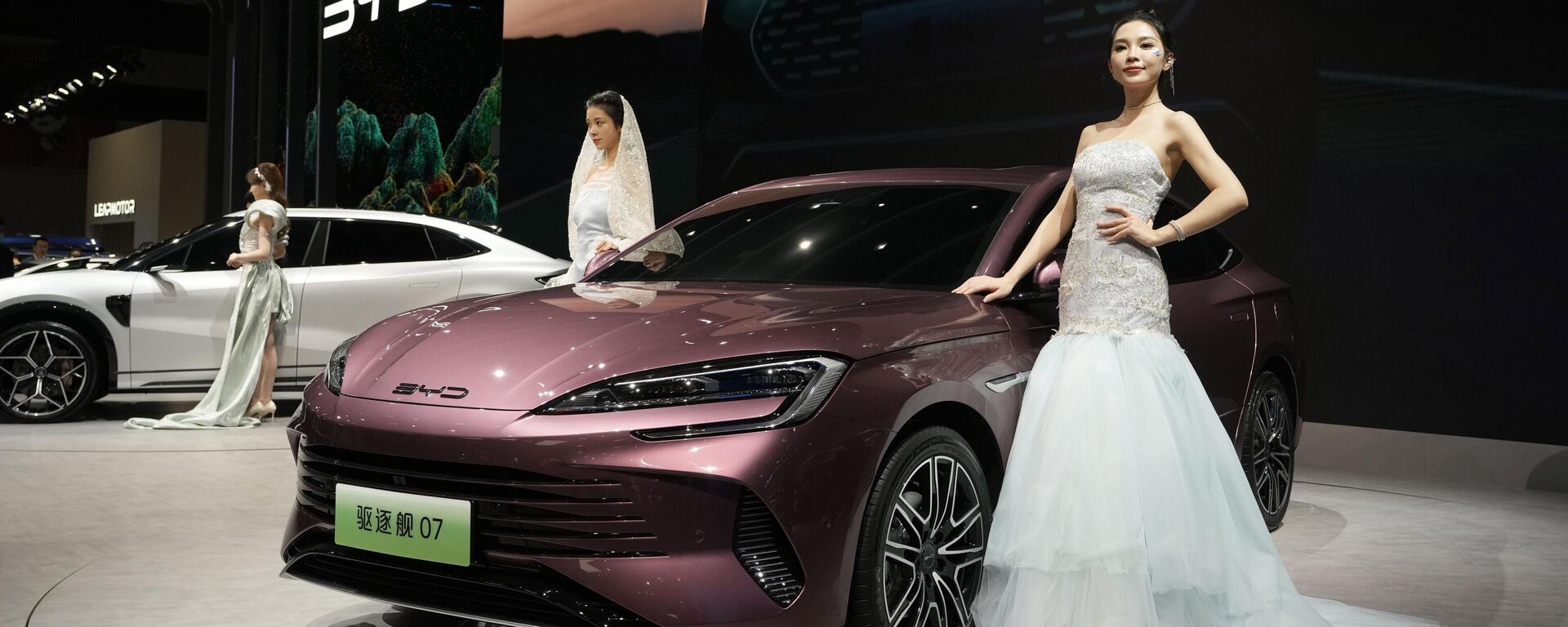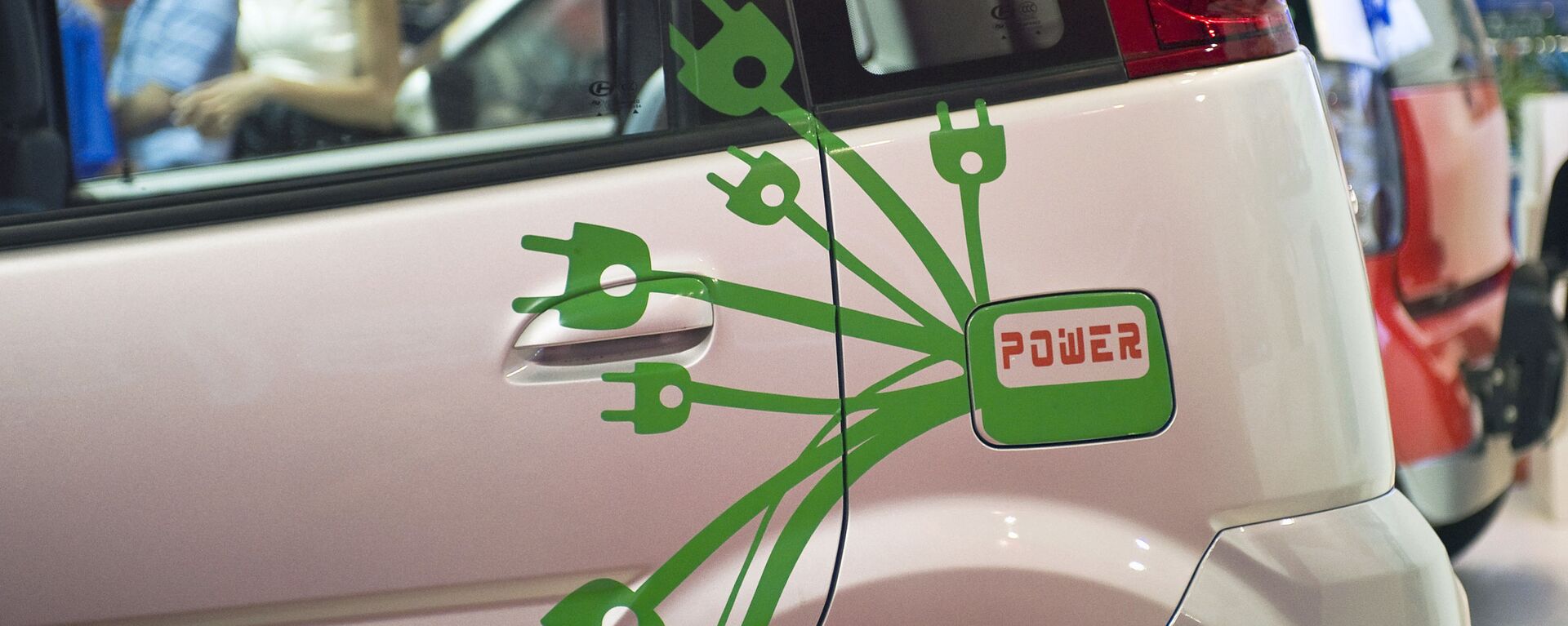https://sputnikglobe.com/20241013/eu-leaders-face-grim-reality-how-did-bloc-seal-status-as-wilting-geopolitical-power-1120537343.html
EU Leaders Face Grim Reality: How Did Bloc Seal Status as Wilting Geopolitical Power?
EU Leaders Face Grim Reality: How Did Bloc Seal Status as Wilting Geopolitical Power?
Sputnik International
Back in the spring of 2022, Russia’s president warned that the European Union’s “suicidal” and “absolutely political” decision to wean itself off of cheap and dependable Russian pipeline energy would culminate in the serious and “perhaps irreversible” loss of competitiveness against other world powers.
2024-10-13T18:40+0000
2024-10-13T18:40+0000
2024-10-13T18:40+0000
economy
vladimir putin
emmanuel macron
aleksander kwasniewski
russia
brussels
china
european union (eu)
volkswagen
bloomberg
https://cdn1.img.sputnikglobe.com/img/107833/72/1078337288_0:160:3073:1888_1920x0_80_0_0_c74fcf17f76dd61e53e1dfd668395857.jpg
“The European project is approaching a tipping point” and threatens to fall into “apathy” and geopolitical irrelevance thanks to internal “political paralysis, external threats and economic malaise,” Bloomberg European Politics & Economics managing editor Ben Sills has suggested in a wistful ode to the EU’s unenviable political and economic prospects in the years to come.“After decades of warnings and sub-par growth, the region’s leaders are suddenly confronting a barrage of evidence that decline is becoming unstoppable,” Sills’ piece, appearing on the NY-headquartered business news agency’s front page on Sunday, warned.Pointing to a string of political and economic ‘bad news’ for Europe’s Europhile forces, from gains by the populist right in France to German carmaker giant Volkswagen’s threats to close factories, to Silicon Valley’s exit from European markets over stringent AI rules, the observer suggested that the developments demonstrate “the EU’s failure to act as a cohesive and dynamic economic bloc” against both adversaries and potentially, its allies across the Atlantic.“Something is changing very dramatically and very, very deeply in this world,” ex-Polish president Aleksander Kwasniewski said. “We can’t react correctly, because we are too slow,” he warned.By comparison, while the US and China – Europe’s major competitors, face problems of their own, they at least have institutions for centralized decision-making, and the ability to “generate vast amounts of private or public capital for defense and investment in cutting-edge technology” – something that’s not the case in the EU’s case.Sills pointed to surprisingly frank comments by Emmanuel Macron at a panel in Germany earlier this month, where the French president highlighted the “risk” the bloc faces of finding itself “out of the market” if it continues its classic strategies, and pointed to the loss of cheap Russian energy supplies after 2022, combined with the Biden administration’s moves to lure European industries out of the bloc via cheap energy and subsidies, as central to undermining the EU’s export-centered economies’ competitiveness.“It’s not just Eurosceptics like Hungary’s Victor Orban, a perennial thorn in the bloc’s side. Officials in core European countries are starting to view the EU as an obstacle they need to get around – rather than the source of prosperity and protection it has represented until now,” the observer stressed, pointing, for example, to Paris’s talk of integration with a smaller bloc of Western European economies, and divisions on issues like defense and Chinese investment inflows.But the EU’s woes have been a longtime coming, Sills stressed, pointing out that the bloc has been in “relative decline” going as far back as the euro monetary union in the late 1990s, and citing a Bloomberg analysis estimating that the bloc would be €3 trillion richer “if it had kept pace with the US - enough to boost the income of the average worker by about €13,000 a year.”Instead, after 2008 and particularly since 2022, many of the region’s traditional powerhouse economies, including Germany, have been teetering on the brink of and occasionally slipping into recession, and facing deindustrialization amid self-inflicted, unsustainably high energy prices, loss of markets and increasingly potent foreign competition.“Today we see that for absolutely political reasons, due to their own ambitions and under pressure from their American overlords, European countries are imposing more and more sanctions on the oil and gas market,” President Putin said in May 2022 as Brussels announced plans to wean itself off of cheap and dependable pipeline-delivered Russian oil and gas.
https://sputnikglobe.com/20240609/trade-war-with-china-us-forcing-eu-to-shoot-itself-in-the-foot-again-1118884766.html
https://sputnikglobe.com/20241009/refusal-to-buy-russian-energy-endangers-eus-economic-growth---orban-1120483293.html
https://sputnikglobe.com/20240715/eu-struggles-to-meet-climate-goals-while-waging-economic-war-on-russia-china-1119375894.html
russia
brussels
china
Sputnik International
feedback@sputniknews.com
+74956456601
MIA „Rossiya Segodnya“
2024
News
en_EN
Sputnik International
feedback@sputniknews.com
+74956456601
MIA „Rossiya Segodnya“
Sputnik International
feedback@sputniknews.com
+74956456601
MIA „Rossiya Segodnya“
is european union an independent geopolitical player, what's hindering europe's geopolitical independence, why is european project failing, is european project at risk, why is eu failing
is european union an independent geopolitical player, what's hindering europe's geopolitical independence, why is european project failing, is european project at risk, why is eu failing
EU Leaders Face Grim Reality: How Did Bloc Seal Status as Wilting Geopolitical Power?
Back in the spring of 2022, Russia’s president warned that the European Union’s “suicidal” and “absolutely political” decision to wean itself off of cheap and dependable Russian pipeline energy would culminate in the serious and “perhaps irreversible” loss of competitiveness against other world powers.
“The European project is approaching a tipping point” and threatens to fall into “apathy” and geopolitical irrelevance thanks to internal “political paralysis, external threats and economic malaise,” Bloomberg European Politics & Economics managing editor Ben Sills has suggested in a wistful ode to the EU’s unenviable political and economic prospects in the years to come.
“After decades of warnings and sub-par growth, the region’s leaders are suddenly confronting a barrage of evidence that decline is becoming unstoppable,” Sills’
piece, appearing on the NY-headquartered business news agency’s front page on Sunday, warned.
Pointing to a string of political and economic ‘bad news’ for Europe’s Europhile forces, from gains by the populist right in France to German carmaker giant Volkswagen’s threats to close factories, to Silicon Valley’s exit from European markets over stringent AI rules, the observer suggested that the developments demonstrate “the EU’s failure to act as a cohesive and dynamic economic bloc” against both adversaries and potentially, its allies across the Atlantic.
“If you wanted to be a geopolitical power, then economic might is the key ingredient,” Free University in Brussels professor Guntram Wolff told the outlet, stressing that in Europe, “productivity growth has just been a disaster,” and that while the region “is still rich...these differentials over 20 years have massive implications.”
“Something is changing very dramatically and very, very deeply in this world,” ex-Polish president Aleksander Kwasniewski said. “We can’t react correctly, because we are too slow,” he warned.
By comparison, while the US and China – Europe’s major competitors, face problems of their own, they at least have institutions for centralized decision-making, and the ability to “generate vast amounts of private or public capital for defense and investment in cutting-edge technology” – something that’s not the case in the EU’s case.
Sills pointed to surprisingly frank comments by Emmanuel Macron at a panel in Germany earlier this month, where the French president highlighted the “risk” the bloc faces of finding itself “out of the market” if it continues its classic strategies, and pointed to the loss of cheap Russian energy supplies after 2022, combined with the Biden administration’s moves to lure European industries out of the bloc via cheap energy and subsidies, as central to undermining the EU’s export-centered economies’ competitiveness.
“That adds to pre-existing challenges posed by the rise of China and its own vast manufacturing machine, and the global leap forward in technology innovation that has largely bypassed the region,” Sills suggested, warning that “the result threatens to cause damage that goes beyond simply lagging in investment and productivity,” causing EU leaders to ‘lose faith’ in the European project itself.
“It’s not just Eurosceptics like Hungary’s Victor Orban, a perennial thorn in the bloc’s side. Officials in core European countries are starting to view the EU as an obstacle they need to get around – rather than the source of prosperity and protection it has represented until now,” the observer stressed, pointing, for example, to Paris’s talk of integration with a smaller bloc of Western European economies, and divisions on issues like defense and Chinese investment inflows.

9 October 2024, 09:43 GMT
But the EU’s woes have been a longtime coming, Sills stressed, pointing out that the bloc has been in “relative decline” going as far back as the euro monetary union in the late 1990s, and citing a Bloomberg analysis estimating that the bloc would be €3 trillion richer “if it had kept pace with the US - enough to boost the income of the average worker by about €13,000 a year.”
Instead, after 2008 and particularly since 2022, many of the region’s traditional powerhouse economies, including Germany, have been teetering on the brink of and occasionally slipping into recession, and facing deindustrialization amid self-inflicted, unsustainably high energy prices, loss of markets and increasingly potent foreign competition.
“Today we see that for absolutely political reasons, due to their own ambitions and under pressure from their American overlords, European countries are imposing more and more sanctions on the oil and gas market,” President Putin
said in May 2022 as Brussels announced plans to wean itself off of cheap and dependable pipeline-delivered Russian oil and gas.
“Rejection of Russian energy resources means Europe will systematically become the region with the highest energy costs in the world…This will seriously – and according to some experts irrevocably – undermine the competitiveness of a significant part of European industry, which is already losing the competition to companies in other regions of the world,” Putin said at the time. “One gets the impression that our Western colleagues, politicians and economists have simply forgotten the foundations of the elementary laws of economics, or, to their detriment, prefer to deliberately ignore them,” he added.





